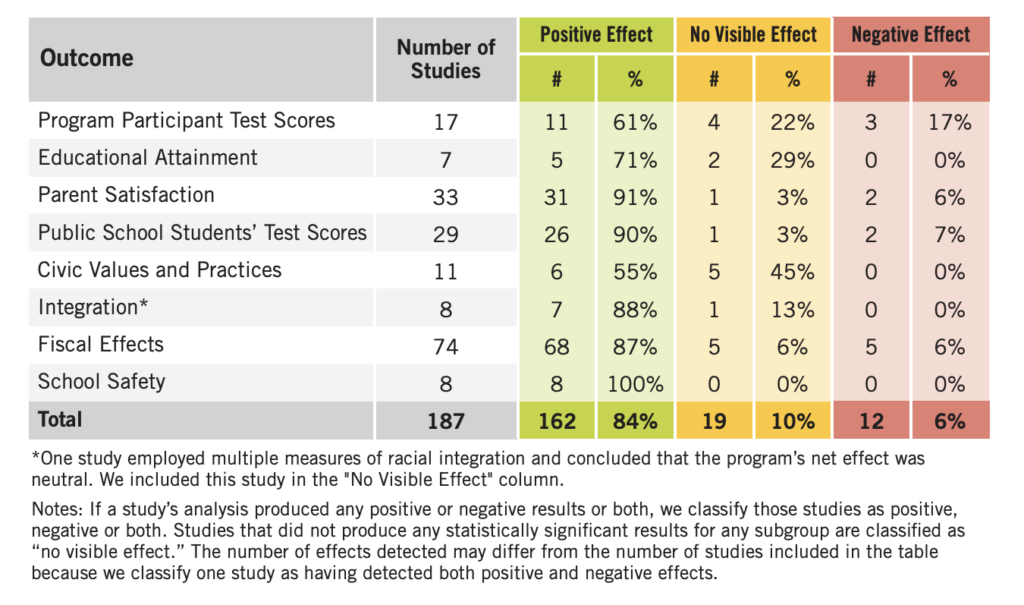Will the overwhelmingly positive effects of educational freedom ever be enough for its critics?
The majority of Minnesotans — 74 percent — support parents being given the right to use the tax dollars designated for their child’s education to send their child to the school that best serves their needs, according to American Experiment’s most recent Thinking Minnesota Poll. Even 61 percent of Minnesotans who identify as Democrats support school choice.
And such support is not misplaced. There is an increasingly large body of empirical evidence on educational freedom — out of 187 studies analyzed by EdChoice, 84 percent found that private school choice programs have positive effects on a range of outcomes described below, 10 percent found no visible effects, and six percent found negative effects.
Overall Effects Counts for Studies of Private School Choice Programs

Program participant test scores
Do students who participate in a private choice program achieve higher reading and math test scores than students who don’t participate?
Yes — a majority of studies on the topic (11 out of 17) found positive effects of private school choice programs on participant test scores. Four studies saw no visible effect on participant test scores, and three studies (two on a Louisiana voucher program and one on a Milwaukee voucher program) found negative outcomes.
Program participant attainment
Are students who participate in a private choice program more likely to graduate from high school, more likely to enroll in college and/or more likely to persist in college than students who don’t participate?
Yes — a majority of studies on the topic (5 out of 7) found positive effects of private school choice programs on educational attainment. Two found no visible effects, and zero found negative effects.
Parent satisfaction
Are parents of students who participate in a private choice program more satisfied with their chosen private school than their previous school?
Yes — a majority of studies on the topic (31 out of 33) found positive effects of private school choice programs on parent satisfaction. One found no visible effects on parent satisfaction, and two found negative effects.
Public school students’ test scores
Are students who remain in public schools worse off when there is a private school choice program in the area?
No — a majority of studies on the topic (26 out of 29) found that public school students experience modest test score gains after a private school choice program is introduced or expanded. One study found no visible effects on public school students’ test scores, and two found negative effects.
Civic values and practices
Does participation in a private school choice program have a positive effect on students’ civic values or how students exhibit civic practices? (Examples: tolerance for the rights of others, civic knowledge, civic participation, volunteerism, social capital, civic skills, voter registration, voter turnout, patriotism.)
Yes — a majority of studies on the topic (6 out of 11) found positive effects of private school choice programs on civic values and practices. Five studies found no visible effect, and zero studies found negative effects.
Racial/ethnic integration
Do private school choice programs help schools become more integrated?
Yes — a majority of studies on the topic (7 out of 8) found positive effects of private school choice programs on integration in schools. This includes both the original school the student attended becoming more integrated and the receiving school becoming more integrated. One study was unable to detect any effects, and zero studies found that private school choice programs made schools less integrated.
Fiscal effects
Do private school choice programs “drain” public schools?
No — a majority of studies on the topic (68 out of 74) found that private school choice programs generate positive fiscal benefits for both taxpayers and school districts. Five studies found that private school choice programs are cost-neutral, and five studies estimated that a program generated net costs (of these, though, four reported net costs in the short run but net savings in the long run).
School safety
Does educational choice have a positive effect on school climate and safety-related issues such as student bullying, physical conflict, gang activities, drug-related problems, discipline issues, and safety practices?
Yes — all eight studies examining educational choice’s impact on school climate and safety found positive outcomes.
______________________
While all this data is not likely to be a debate-ender on school choice, it should at minimum inform the school choice debate. I think we can all agree that the goal of education is to benefit students, and private school choice programs clearly contribute to this goal.